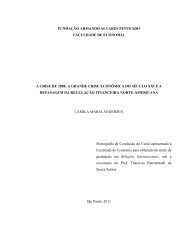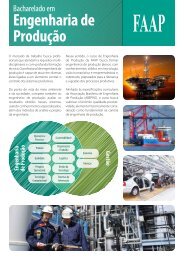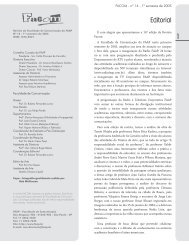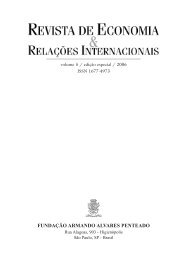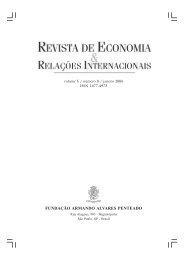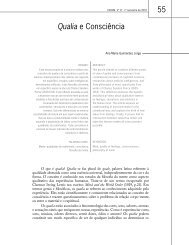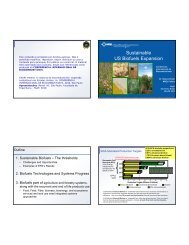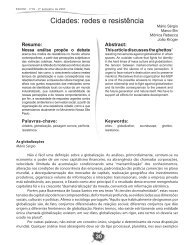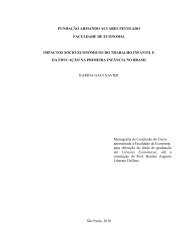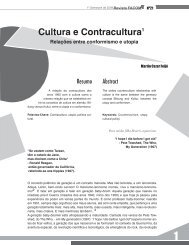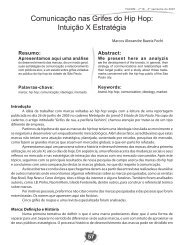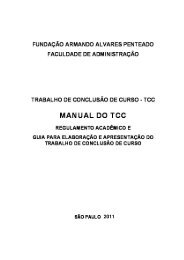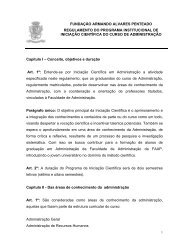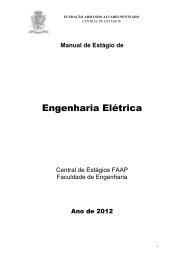Guia de Estudos - Faap
Guia de Estudos - Faap
Guia de Estudos - Faap
Create successful ePaper yourself
Turn your PDF publications into a flip-book with our unique Google optimized e-Paper software.
4. Deal comprehensively with the <strong>de</strong>bt problems<br />
of the <strong>de</strong>veloping countries though national<br />
and international measures to make <strong>de</strong>bt sustainable<br />
in the long term.<br />
5. In cooperation with pharmaceutical companies,<br />
provi<strong>de</strong> access to affordable, essential drugs in<br />
<strong>de</strong>veloping countries.<br />
6. In cooperation with the private sector, make<br />
available benefits of new technologies, especially information<br />
and communication (ICTs).<br />
All this targets show the urgency to strengthen<br />
global partnership among actors of international relations<br />
to achieve the other goals, and this it is only possible<br />
when all the countries are willing to improve the<br />
current public polices and the most difficult, regulating<br />
and <strong>de</strong>fining responsibilities of each country according<br />
to their financial and <strong>de</strong>velopment capacity.<br />
Always good to keep in mind that, according to<br />
Weiss and Gor<strong>de</strong>nker, the role of non-state actors –<br />
firms, business associations, NGOs, social movements<br />
– in the international scene is certainly the consequence<br />
of the impetus of NGO networks for <strong>de</strong>mocratizing<br />
global policy-making.<br />
HISTORy OF THE PROBLEM<br />
International cooperation has always been present<br />
among international relations issues. Meanly after<br />
1944 when the Bretton Woods Conference was held,<br />
after the end of the second world, with the purpose<br />
of bringing up efforts to rebuild the <strong>de</strong>stroyed countries.<br />
The raise of aid, which came from many different<br />
countries as an expected result for Bretton Woods<br />
conference, was the first evi<strong>de</strong>nce of the birth of international<br />
cooperation in the 21st century.<br />
The <strong>de</strong>mand for settling international financial institutions,<br />
a task that would be to control and maintain<br />
of the international market and commerce, came<br />
from the necessity and call for help in the reconstruction<br />
of the damaged countries in the Second World<br />
War. Through these institutions, as the International<br />
Bank for Reconstruction and Development (IBRD),<br />
for example, and its programs, their manner of assis-<br />
116<br />
VII Fórum FAAP <strong>de</strong> Discussão Estudantil - 2011<br />
tance would be given and the aids would be distributed<br />
throughout the countries could be <strong>de</strong>ci<strong>de</strong>d in common<br />
sense among members. In this scenery, the United Nations<br />
(UN) was created in 1948 to organize the efforts and<br />
to gather the international community around the issue of<br />
international security, pursing peace in the world. Chasing<br />
the goal of consolidating global governance in the world,<br />
during General Assembly meetings and as there was the<br />
need for big efforts towards reconstruction and <strong>de</strong>velopment,<br />
international cooperation was the best tool for this<br />
task and so Member States came up with the following<br />
concept: technical assistance and cooperation.<br />
Along the following years after the end of the Second<br />
World War, less <strong>de</strong>veloped countries felt like being left a<br />
part of international commerce relations that existed between<br />
most of the <strong>de</strong>veloped countries. The lack of economic<br />
<strong>de</strong>velopment in some countries ma<strong>de</strong> them unable<br />
to join the international network of commerce and<br />
unable to compete with others, so as long as they were<br />
kept outsi<strong>de</strong> of the commerce they become even weaker<br />
while the ones that were taking part on this network were<br />
becoming stronger.<br />
Trying to become stronger, the weak countries joined<br />
together in a group formed by 77 countries, G77, where<br />
countries would claim for a different treatment in the<br />
commercial field, so they would have some advantage<br />
upon the <strong>de</strong>veloped countries, something they could use<br />
to their benefit towards <strong>de</strong>velopment. Thus, the necessity<br />
of aid to the less privileged economically countries as to<br />
the low-income countries were simply essential 2 .<br />
This movement occurred in 1960 during a meeting of<br />
the United Nations Conference on Tra<strong>de</strong> and Development<br />
(UNCTAD), which was run by Raúl Prebisch at the<br />
time and had a goal to shrink the gap between <strong>de</strong>veloped<br />
and un<strong>de</strong>veloped through a special treatment. A mechanism<br />
used for this was tariff preferences in the commercial<br />
relations of the least <strong>de</strong>veloped States, thus giving<br />
them a chance to strengthen their inner sectors 3 . The goal<br />
of the Conference was: “[t]o keep and go <strong>de</strong>eper into the<br />
common interest existed in the <strong>de</strong>veloping world, and to<br />
strengthen up the ability of trading within and among<br />
the states of UN, all done by working with all UN’s agencies<br />
and so through these agencies technical cooperation<br />
would be promoted among them.”<br />
UNCTAD gui<strong>de</strong>d the countries to improve and stress<br />
their economic links, thus strengthening up their eco-




